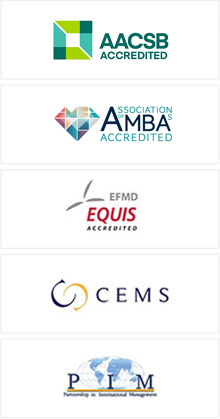Business Technology (BSc)
Studies in the Bachelor’s Programme in Business Technology will provide you with an overall view of different business functions and their interdependence, good analytical skills, a strong theoretical background and the ability to apply theories in business problems. You will learn about the key issues in management technology and ways of developing information systems and associated business processes and services. You will also learn to develop, analyze and implement logistic systems as well as innovation processes and new product commercialization.
Graduates will be able to use managerial tools (such as quantitative models and information technology) in planning and problem solving, and be familiar with issues and methods regarding development of business and information networks, as well as with concepts for sourcing, production, and distribution of goods and services.
Students who have been accepted to the Bachelor's Programme in Business Technology have the right to continue their studies in the appreciated Master's Programme in Information and Service Management.
Students who want to study Business Technology in Aalto University apply for a degree in Bachelor and Master of Science in Economics and Business Administration. Bachelor’s programme at the Helsinki Campus is only offered in Finnish. For Bachelor’s programme in Helsinki, applicants need to be able to prove their proficiency in Finnish by taking a National Certificate of Language Proficiency in Finnish.
The programme is divided roughly to three main programs: Information Systems Science, Logistics and Management Science.
Information Systems Science aims at helping people, organizations and societies to adopt new information and communication technology (ICT) in a way that is beneficial for all stakeholders. ISS is focusing on for example Strategic planning, Information systems development and requirements engineering, Business models for E- and multichannel business, Consumer behaviour and information search in electronic media, and Decision Support Systems
Example courses:
- Management Information Systems
- Information Systems Development
- Enterprise Applications
- Introduction to Programming
Logistics concentrates on the management of production, material and information flows as well as sourcing and customer services. It combines operational level issues, such as distribution, warehousing, order processing and packacing, with strategic level decision making related to such as competitive advantage and organizations vision.
Example courses:
- Distribution and Logistics Services
- Purchasing and Supply Management
- Management of Technology
Management Science offers tools for risk management, decision making under uncertainty, negotiations, group decision making as well as managing network organizations to mention some fields. It emphasizes mathematical methods such as optimization, performance analysis, simulation, probability and statistical methods.
Example courses:
- Business Decisions 1
- Econometrics
- Quantitative Business Analysis
- Negotiation Analytics




